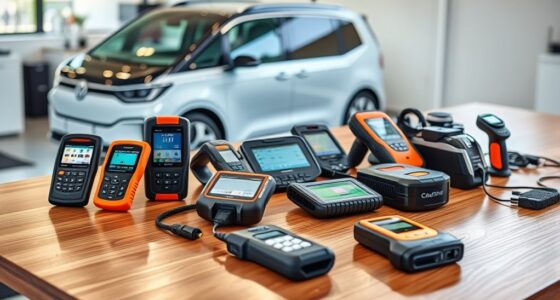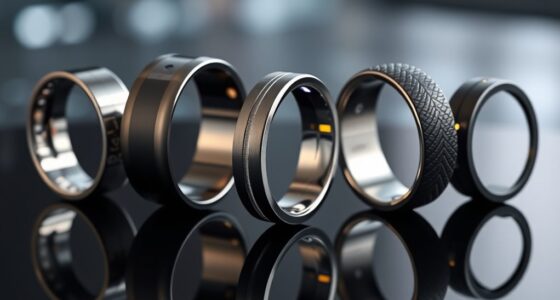If you’re looking for the best vintage VW ignition dwell meters, I recommend checking out models like the Accu-Fire Electronic Ignition Kit and Cal-Van Tools’ high-energy tester. These tools help you fine-tune your engine’s timing, ensuring peak performance and reliability of your classic VW. Factors like compatibility, accuracy, and build quality are key. Keep exploring further, and you’ll find some great options that suit your restoration projects perfectly.
Key Takeaways
- The list features top-rated vintage VW ignition dwell meters compatible with 6V and 12V systems from 1960-1979.
- Selection considers accuracy, durability, ease of use, and compatibility with classic VW distributor types.
- Digital and analog models include features like auto-zeroing and clear displays for precise timing adjustments.
- These meters help classic car enthusiasts optimize engine performance and troubleshoot ignition issues effectively.
- The list emphasizes reliable, well-built dwell meters suitable for DIY maintenance and professional restoration projects.
Accu-Fire Electronic Ignition Kit for VW Empi 9432 Baja Bug/Buggy

If you’re upgrading a VW 009 distributor in your Baja Bug or dune buggy, the Accu-Fire Electronic Ignition Kit is an excellent choice. I found it to be a straightforward, bolt-on replacement that fits models like the VW Type 1 Beetle, Karmann Ghia, and sand rails. It features a magnetic trigger disc, sensor module, and hardware made from high-performance materials, ensuring stable performance and resistance to interference. Installation is simple, and it seamlessly integrates with 12-volt systems. While some users report durability issues, many appreciate its ease of use and reliable operation for upgrading their classic engines.
Best For: DIY enthusiasts and classic VW dune buggy or Baja Bug owners seeking an easy-to-install electronic ignition upgrade compatible with 12-volt systems.
Pros:
- Simple bolt-on replacement compatible with various VW models and 009 distributors
- Made from high-performance materials ensuring stable operation and interference resistance
- Easy installation with seamless integration into existing setups
Cons:
- Reports of durability issues, with some units failing after a short period of use
- Occasional wiring or tuning challenges noted by users during installation
- Mixed reviews on long-term reliability, with some users experiencing early failure
Cal-Van Tools 64 High Energy Ignition Tester

The Cal-Van Tools 64 High Energy Ignition Tester is an excellent choice for technicians and DIY enthusiasts who need a safe, reliable way to check spark presence in ignition systems with 1-12 cylinders. It’s easy to use—just attach the spark plug wire, clip it to the engine, crank, and watch for the spark. The sealed chamber minimizes fire risk, making it safer around high-pressure fuel systems and marine applications. Compact and lightweight, it offers quick, accurate tests and is compatible with various ignition setups. Rated 4.3 stars, many users appreciate its safety features and straightforward operation, making it a handy tool for vintage VW and other classic car testing.
Best For: DIY enthusiasts and professional technicians seeking a safe, reliable tool for quick spark checks in ignition systems with 1-12 cylinders.
Pros:
- Easy to use with straightforward attachment and operation
- Sealed chamber reduces fire risk around high-pressure fuel systems and marine applications
- Compact, lightweight design for portability and quick testing
Cons:
- Some users report occasional inconsistent operation
- Price may vary; potential for finding better deals elsewhere
- Limited to ignition system testing; not suitable for other diagnostic purposes
76500 Ignition Coil Tester

The 00 Ignition Coil Tester stands out as an essential tool for both professional and DIY mechanics who need quick, non-intrusive diagnostics of ignition coils. It detects magnetic fields around energized coils, providing instant verification without unplugging wires or complex tests. Just hold the sensing tip near the coil during engine operation, and the blue LED lights up if the coil is active. Lightweight and compact, it’s easy to use during daytime, thanks to its bright LED indicator. Reliable and straightforward, this tester helps identify misfires or faulty coils quickly, saving time and effort during ignition troubleshooting. It’s a practical addition to any vintage VW enthusiast’s toolkit.
Best For: DIY enthusiasts and professional mechanics seeking quick, reliable, non-intrusive ignition coil testing during engine diagnostics.
Pros:
- Easy to use with instant visual confirmation via a bright LED indicator.
- Non-intrusive testing method that doesn’t require unplugging wires.
- Compact and lightweight design, ideal for portable use and daytime diagnostics.
Cons:
- May not detect coil activity if the engine is not actively energizing the coil during testing.
- Some users report difficulty seeing the LED in very bright sunlight.
- Limited to magnetic field detection; cannot identify all coil or ignition system issues directly.
AIP Electronics Power Pack for Vintage Volkswagen Vehicles

AIP Electronics Power Pack is the ideal choice for vintage Volkswagen enthusiasts seeking a reliable and straightforward ignition upgrade. This kit includes a vacuum advance distributor and vintage-style plug wires, designed specifically for 1960-1979 VW models like the Bug, Bus, and Ghia. Built for performance, it features low Ohm wires with Kevlar cores that transmit sparks up to 80,000 VAC. The components are weatherproof and easy to install, making it suitable for both DIYers and professionals. With OE standards met, this power pack guarantees long-lasting reliability, improved spark energy, and better engine performance—an essential upgrade for keeping your classic VW running smoothly.
Best For: Vintage Volkswagen enthusiasts and mechanics seeking a reliable, easy-to-install ignition upgrade for 1960-1979 VW models.
Pros:
- High-quality low Ohm plug wires with Kevlar cores for superior spark transmission up to 80,000 VAC
- Weatherproof, watertight connections ensure durability in various conditions
- Easy plug-and-play installation suitable for both DIYers and professionals
Cons:
- Compatibility verification required before purchase to ensure proper fitment
- Limited to vintage VW models from 1960-1979; not suitable for newer vehicles
- May require professional tuning for optimal performance in some cases
Stens in-line Ignition Tester 752-329, Black

Designed for outdoor equipment enthusiasts and mechanics, the Stens in-line Ignition Tester 752-329 offers a quick and easy way to verify spark activity. It connects between the ignition coil and spark plug, with a clear window to observe spark strength instantly. This tool simplifies troubleshooting by confirming whether the ignition system is functioning properly, saving time during repairs. While praised for its convenience, some users note safety concerns due to exposed wiring and loose fittings, which may require modifications. Despite these issues, it remains a handy, affordable tester—best suited for occasional use and quick diagnostics on small engines and vintage vehicles.
Best For: outdoor equipment enthusiasts and mechanics needing a quick, affordable way to verify spark activity on small engines and vintage vehicles.
Pros:
- Easy to use with instant visual confirmation of spark strength
- Compact and lightweight, convenient for quick diagnostics
- Affordable option suitable for occasional troubleshooting
Cons:
- Safety issues due to exposed wiring and loose fittings that may cause arcing or fires
- Durability concerns, with parts potentially falling apart after short-term use
- Limited brightness of the indicator window, which may affect visibility during operation
Ignition System Tester, Hand-Held 12V DC with LED

If you’re troubleshooting ignition systems on various vehicles, the Ignition System Tester, Hand-Held 12V DC with LED, is an essential tool for quickly verifying spark consistency. This battery-operated device tests Coil On Plug (COP) systems by receiving signals from secondary ignition coils. It checks if the voltage and arc duration are correct, providing instant feedback with beeps and LED flashes—red for voltage, green for arc duration. Small, lightweight, and easy to use, it’s perfect for rapid diagnostics. Whether you’re a professional or a hobbyist, this tester simplifies identifying ignition problems, saving time and ensuring your vintage VW’s ignition system is firing properly.
Best For: DIY enthusiasts and professional mechanics seeking a quick, reliable way to test ignition coils and ensure proper spark generation in various vehicles.
Pros:
- Easy to use with visual LED indicators and audible beeps for instant results
- Compact, lightweight design makes it portable and convenient for on-the-go diagnostics
- Compatible with most cars, suitable for both professional and hobbyist use
Cons:
- May not be suitable for vehicles with non-standard ignition systems or high-voltage coils
- Requires a 12V DC power source, limiting use in certain setups without adapters
- Limited to testing coil output; does not diagnose other ignition system issues
ANTO Spark Plug Engine Ignition Coil Tester for Small Engine Vehicles

The ANTO Spark Plug Engine Ignition Coil Tester stands out as an essential tool for anyone troubleshooting ignition issues across a variety of small engines, such as lawnmowers, chainsaws, and trimmers. It’s designed to quickly diagnose ignition or fuel delivery problems, making it ideal for small and large engines alike. With a compact metal interface, a 4.44-inch shaft, and a 6.53-inch cable, it’s easy to handle. Simply remove the spark plug boot, insert the tester, and check for spark presence and strength. While it’s praised for simplicity and effectiveness, some users find it limited in measuring spark quality, but overall, it’s a practical, valuable diagnostic device.
Best For: DIY enthusiasts and small engine users seeking an easy, safe way to diagnose ignition issues across various small and large engines like lawnmowers, chainsaws, and generators.
Pros:
- Simple and quick to use, enabling efficient troubleshooting
- Compatible with a wide range of small and large engine types
- Provides a safe alternative to manual spark testing, reducing risk
Cons:
- Limited ability to measure spark strength or confirm spark consistency
- Some users experience initial device malfunction or difficulty in getting accurate readings
- Does not provide detailed diagnostics or spark quality information
1847A Electronic Ignition Module for VW Vehicles

The 1847A Electronic Ignition Module is an excellent choice for vintage VW enthusiasts seeking reliable, high-performance ignition control. It’s waterproof and compatible with a wide range of VW models, including Beetle, Karmann Ghia, Squareback, Transporter, and more. Designed for 12V negative ground systems, it delivers high voltage to spark plugs, enhancing engine power, fuel efficiency, and spark plug lifespan. Its epoxy-molded construction resists dirt, oil, and moisture, ensuring durability in tough conditions. The plug-and-play design makes installation quick and simple. Overall, this module offers dependable performance, making it a valuable upgrade for classic VW owners.
Best For: vintage VW enthusiasts and classic car owners seeking a reliable, high-performance ignition upgrade compatible with various VW models.
Pros:
- Waterproof construction ensures durability in harsh conditions
- Easy plug-and-play installation for quick setup
- Enhances engine performance, fuel efficiency, and spark plug lifespan
Cons:
- Compatibility limited to 12V negative ground systems only
- Requires verification of vehicle model and year before purchase
- First available date is March 4, 2025, so may not be immediately accessible
1281 Ignition Conversion Kit for Ford, Mercury, Lincoln 8-Cylinder (1957-1974)

Designed specifically for owners of classic Ford, Mercury, and Lincoln V8 engines from 1957 to 1974, the 1281 Ignition Conversion Kit offers a straightforward upgrade by replacing points with a reliable electronic module. It’s compatible with 12-volt negative ground systems and suits models with V8 engines like the 260, 302, 351, 390, and 427, excluding Y-Block engines. Made for durability, it exceeds OE specs and resists dirt and moisture, ensuring steady performance. Installation is simple—just bolt it onto the distributor, replacing the points assembly. This kit provides a more reliable ignition trigger, making it a popular choice for classic car enthusiasts seeking a hassle-free upgrade.
Best For: classic Ford, Mercury, and Lincoln V8 engine owners from 1957 to 1974 seeking a reliable, easy-to-install ignition upgrade.
Pros:
- Durable construction exceeds OE specifications, resistant to dirt and moisture.
- Simple bolt-on installation replacing points assembly for hassle-free setup.
- Compatible with a wide range of V8 engines including 260, 302, 351, 390, and 427.
Cons:
- Mixed customer reviews with some ratings as low as 1-star.
- Limited to 12-volt negative ground systems, not suitable for other configurations.
- Manufactured in China, which may concern some buyers regarding quality control.
Automotive Multimeter Engine Analyzer (AIOMEST AI-770K)

Automotive professionals and serious DIYers will find the AIOMEST AI-770K especially useful because it combines multiple diagnostic functions into one compact device. It measures RPM, pulse width, duty cycle, and dwell angle for various engine types, making it versatile for engine tuning. Additionally, it offers electrical testing capabilities like voltage, current, resistance, capacitance, and temperature, along with features such as diode testing and non-contact voltage detection. Its auto-ranging, auto-zero, and backlit display make it user-friendly. While it’s packed with features, some users report inconsistent readings and occasional device failures, so verifying performance before critical use is advisable.
Best For: automotive professionals and serious DIYers seeking a comprehensive, multi-functional diagnostic multimeter for engine tuning and electrical troubleshooting.
Pros:
- Combines multiple diagnostic functions into one compact device, including RPM, pulse width, duty cycle, dwell angle, and electrical tests
- Features user-friendly auto-ranging, auto-zero, and backlit display for ease of use in various conditions
- Affordable alternative to high-end branded diagnostic tools with broad measurement capabilities
Cons:
- Reports of inconsistent readings and unreliable performance, especially for RPM and dwell angle measurements
- Some units have experienced device failures or short-circuiting shortly after purchase
- Restricted return policies and challenging customer service may complicate warranty claims or exchanges
Factors to Consider When Choosing an Ignition Dwell Meter Vintage VW

When selecting an ignition dwell meter for my vintage VW, I consider several key factors to guarantee it meets my needs. I look at compatibility with my specific VW models, as well as accuracy, ease of use, durability, and measurement range options. These points help me choose a reliable tool that delivers precise readings and long-lasting performance.
Compatibility With VW Models
Are you sure your vintage VW model is compatible with the ignition dwell meter you’re considering? It’s essential to verify that the meter is designed for classic VW models like Beetle, Karmann Ghia, or Type 1, as some meters are specifically made for these cars. You’ll also want to ensure it supports the voltage and electrical system your VW uses, typically 6V or 12V, from 1960 to 1979. Check if the meter can easily connect to your distributor, especially if it has points-based ignition systems common in vintage models. Additionally, confirm that its measurement range and calibration match your engine’s needs. Compatibility with OEM part numbers and distributor types helps prevent mismatches and guarantees accurate, hassle-free tuning.
Accuracy and Precision
To guarantee your vintage VW ignition system runs smoothly, selecting a dwell meter with high accuracy and precision is vital. Accurate readings within a narrow margin, typically ±1°, are critical for proper ignition timing adjustments. High-quality internal components and precise calibration ensure the meter maintains its accuracy over time, preventing misadjustments. The ability to detect small changes in dwell angle—often less than 1°—directly impacts tuning precision, making it easier to optimize engine performance. Consistent readings across multiple tests indicate reliability, reducing the risk of errors. Digital dwell meters generally offer higher precision than analog models, thanks to features like auto-zero and fine resolution. Choosing a meter with these qualities helps achieve accurate, reliable ignition settings for your vintage VW.
Ease of Use
Choosing an ignition dwell meter that is easy to use can make all the difference when tuning your vintage VW. Clear, easy-to-read displays help me quickly interpret readings without confusion, saving time during adjustments. Simple operation with minimal wiring and straightforward procedures makes the process less frustrating, especially for those new to vintage VW maintenance. Features like auto-zeroing and auto-ranging streamline measurements, reducing the chance of user error and making tuning more efficient. An ergonomic design and intuitive controls ensure comfort during use, whether I’m a beginner or experienced mechanic. Compatibility with vintage VW ignition systems and clear setup instructions are essential, as they help avoid headaches and ensure accurate readings. Overall, ease of use keeps the tuning process smooth and accessible for all enthusiasts.
Durability and Build Quality
When selecting an ignition dwell meter for vintage VW maintenance, durability and build quality are essential considerations. A good meter should be made from high-quality, impact-resistant materials to withstand the harsh conditions of automotive work. Robust construction ensures it can handle frequent use and rough handling without breaking or malfunctioning. Weatherproof features, like sealed cases and corrosion-resistant components, are crucial for longevity when exposed to moisture, dirt, and grease. Reliable internal electronics, including stable circuits and high-grade sensors, help maintain accuracy over time and prevent drift. Additionally, reinforced wiring and connectors resist wear and tear during repeated testing. Overall, a well-built dwell meter not only lasts longer but also provides consistent, dependable readings, making it a worthwhile investment for any vintage VW enthusiast.
Measurement Range Options
Selecting an ignition dwell meter with the right measurement range is crucial for accurate diagnostics on vintage VW engines. Most meters offer ranges from 0° to 90°, covering typical ignition systems. Some models have adjustable ranges, like 0°-60° or 0°-75°, allowing you to match specific engine requirements. Accurate readings depend on the meter’s range encompassing the expected ignition point, usually between 30° and 70°. A wider measurement range increases compatibility across various VW models and ignition setups. Multi-range meters provide flexibility for troubleshooting and fine-tuning ignition timing. Choosing the right range ensures precise readings, helping you diagnose issues effectively and maintain your vintage VW’s peak performance. Always consider your engine’s specifications when selecting a meter with suitable measurement options.
Calibration and Adjustment
Proper calibration is essential to guarantee your vintage VW ignition dwell meter provides accurate readings. By aligning the needle or digital display with a known reference, you ensure precise measurement of the dwell angle. Regular adjustments of the meter’s zero or baseline are necessary to counteract drift caused by temperature fluctuations or aging components. Many vintage meters include built-in calibration screws or trimmers, allowing for fine-tuning to match manufacturer specifications. To verify accuracy, calibration should be performed using a reliable test source or a certified reference. Neglecting proper calibration can result in incorrect dwell angle readings, which may lead to improper ignition timing and engine performance issues. Taking the time to calibrate and adjust your meter ensures reliable readings and optimal engine performance.
Price and Value
Choosing the right ignition dwell meter for your vintage VW involves balancing cost with the features and performance you need. Basic models can cost under $50, making them a budget-friendly option for casual use. However, more advanced digital units often exceed $200, offering greater accuracy, durability, and additional testing features. When evaluating value, consider factors like display type, measuring range, and compatibility with your vintage VW’s ignition system. A higher-priced meter may cost more upfront but can provide precise readings and last longer, saving money in the long run. Cheaper models might work for simple checks but could lack accuracy or durability, leading to potential replacement costs. Striking the right balance between price, features, and build quality ensures better performance and long-term value.
Frequently Asked Questions
How Does Ignition Dwell Affect Overall Engine Performance?
Understanding how ignition dwell affects engine performance is vital. I know that dwell time, the period the contact points stay closed, directly impacts spark duration. If it’s too long or too short, the engine can run poorly, lose power, or stall. Proper dwell guarantees essential spark energy, smoother idling, and better acceleration. I always check and adjust dwell to keep my engine running efficiently and reliably.
What Are Common Signs of a Faulty Ignition Dwell Meter?
When checking for a faulty ignition dwell meter, I look out for inconsistent readings or sudden fluctuations. If the meter shows no change despite adjusting the ignition, that’s a red flag. Also, if it produces erratic or impossible values, it probably isn’t functioning properly. I’ve learned that a reliable dwell meter should give steady, repeatable readings, helping me fine-tune my engine for peak performance.
Can Vintage VW Ignition Dwell Meters Be Used on Modern Engines?
Using a vintage VW ignition dwell meter on modern engines isn’t ideal. I’ve found that these meters are calibrated for older ignition systems and might not provide accurate readings on newer, more sophisticated engines. Modern engines often require digital or advanced diagnostic tools that can handle complex electronic controls. So, I’d recommend sticking with contemporary equipment for modern engines to guarantee precision and reliable diagnostics.
How Often Should Ignition Dwell Be Calibrated in Classic VWS?
Thinking about your classic VW’s ignition dwell? I’d say it’s best to check it every 3,000 miles or so, especially if you’re enjoying long drives. Regular calibration helps keep your engine humming smoothly and guarantees ideal performance. If you notice rough idling or poor acceleration, it’s a good sign to revisit the dwell setting sooner. Staying attentive to these details keeps your vintage VW running beautifully, mile after mile.
Are There Digital Alternatives to Traditional Analog Dwell Meters?
You’re wondering if digital alternatives to traditional analog dwell meters exist. I’ve found that digital dwell meters are definitely available and becoming more popular because they’re easier to read and often more precise. They connect directly to your vehicle’s ignition system and display real-time data electronically. I recommend exploring models designed specifically for vintage cars, as they often include features tailored for classic VW engines, making tuning more straightforward and accurate.
Conclusion
Choosing the right vintage VW ignition dwell meter can feel like finding a needle in a haystack, but with the right tool, you’ll bring your classic ride back to life faster than you can say “restoration legend.” Whether you prefer electronic modules or testers, trust me, the perfect meter makes all the difference—turning your vintage VW into a roaring masterpiece. Jump right in, pick your favorite, and get ready to impress!









